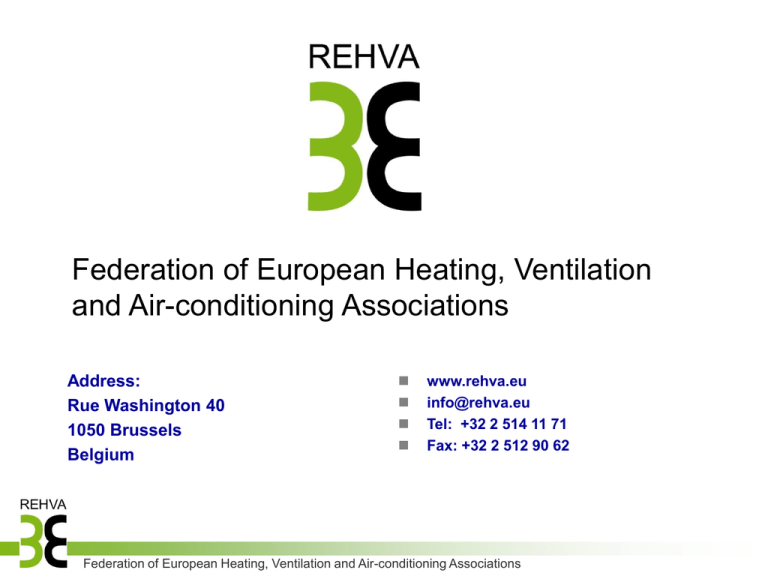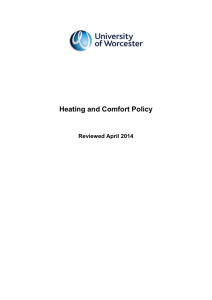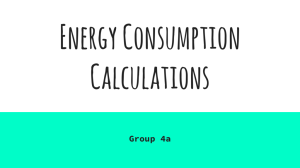Low Temperature Heating and High Temperature Cooling
advertisement

Federation of European Heating, Ventilation and Air-conditioning Associations Address: Rue Washington 40 1050 Brussels Belgium www.rehva.eu info@rehva.eu Tel: +32 2 514 11 71 Fax: +32 2 512 90 62 Federation of European Heating, Ventilation and Air-conditioning Associations Use of REHVA Guidebook Power Point Presentations •This Power Point Presentation can be freely used for training purposes by REHVA members. •It is prepared by the main author to the REHVA Guidebook. •Please refer the original author always when making the presentation. •Inform REHVA secretariat each time the presentation is used: info@rehva.eu Federation of European Heating, Ventilation and Air-conditioning Associations REHVA Guidebook No 7: Low temperature heating and high temperature cooling Jan Babiak Bjarne W. Olesen Dusan Petras Federation of European Heating, Ventilation and Air-conditioning Associations List Of Content 1. Terminology, Symbols and Units 2. Basic principles of radiant surface heating and cooling 3. Indoor Environmental Conditions 4. Systems Types and Estimation of Heating/Cooling Capacity 5. Control and Operation 6. Energy Sources 7. Installation 8. Safety 9. Application of Systems in Buildings 10. Design Tools References Federation of European Heating, Ventilation and Air-conditioning Associations 1. Terminology • Embedded surface heating and cooling system – A system consists of circuits of pipes embedded in floor, wall or ceiling construction, distributors and control equipment • Embedded systems insulated from the main building structure – Floor, wall and ceiling surface system thermally insulated from building structure (slabs, walls) • Floor (wall, ceiling) heating and cooling system, water based – Floor (wall, ceiling) system where pipes carrying water with or without additives as a medium are laid in the floor (wall, ceiling) • Thermally-Active Building System, TABS – Surface heating and cooling systems with pipes thermally coupled and embedded in the building structure (slabs, walls) • Radiant ceiling panels, heating and cooling – Suspended, usually metal panels distant under the ceiling with fluid temperature relative close to room temperature. May be insulated from building structure (slabs) Federation of European Heating, Ventilation and Air-conditioning Associations Type of systems a b Figure 4.1 - Examples of water based radiant systems c Federation of European Heating, Ventilation and Air-conditioning Associations d 2. Basic principles - Three Physical mechanisms of Heat transfer - Convection, conduction, radiation - Thermal balance of a room with radiant surface heating/cooling Federation of European Heating, Ventilation and Air-conditioning Associations 2. Basic principles Heat exchange: - View and angle factor – two examples: Office room Window Industrial room 2,0 3,0 10 1,0 40 5,0 3,0 20 Federation of European Heating, Ventilation and Air-conditioning Associations 2. Basic principles Angle factor – typical values: Angle factor Fp-N office room Surface Seated industrial room Standing Seated Standing floor 0,32 0,24 0,48 0,48 ceiling 0,12 0,12 0,22 0,22 front wall (win) 0,03 0,04 0,03 0,03 window 0,06 0,06 back wall 0,09 0,10 0,03 0,03 right side wall 0,19 0,22 0,12 0,12 left side wall 0,19 0,22 0,12 0,12 - - Federation of European Heating, Ventilation and Air-conditioning Associations 3. Indoor environmental conditions Thermal Environment • Operative Temperature • Surface Temperature (Wall, floor, ceiling) • Vertical Air Temperature Difference • Radiant Temperature Asymmetry • Draft – Air velocity – Calculation of down draft from cold surfaces Indoor Air Quality Air temperature and Humidity Acoustic Comfort and Noise Federation of European Heating, Ventilation and Air-conditioning Associations 4. Types of systems, heating cooling capacity - Heat exchange coefficient between surface and space Radiant heating and cooling panels Pipes isolated from main building structure Thermo Active Building Systems (TABS) - System description - Heating and cooling capacity - System testing - Dynamic capacity calculations Federation of European Heating, Ventilation and Air-conditioning Associations 4. Types of systems, heating cooling capacity Heat exchange coefficient between surface and space Total heat exchange coefficient W/m².K Heating Floor Acceptable surface temperature °C Cooling Max. Min. Heating Cooling Maximum capacity W/m² Heating Cooling Perimeter 9-11 7 35 20 165 42 Occupied Zone 9-11 7 29 20 99 42 Wall 8 8 ~40 17 160 72 Ceiling 6 9-11 ~27 17 42 99 Federation of European Heating, Ventilation and Air-conditioning Associations Types of systems, EN 15377 Pipes isolated from main building structure A - System with pipes embedded in the screed or concrete B - System with pipes embedded outside of the screed C - System with pipes embedded in the screed D – Plane section systems Type D Federation of European Heating, Ventilation and Air-conditioning Associations Types of systems, EN 15377 Thermo Active Building Systems (TABS) E - System with pipes embedded in the massive concrete slabs F - Capillary pipes embedded in a layer at the inner surface Federation of European Heating, Ventilation and Air-conditioning Associations Types of systems, EN 15377 G - System with pipes embedded in the a wooden construction Federation of European Heating, Ventilation and Air-conditioning Associations 4. Types of systems, heating cooling capacity Floor Heating q = 8,92 (θi - θS,m)1,1 [W/m2] Federation of European Heating, Ventilation and Air-conditioning Associations ALUMINUM HC device: Floor Heating & Cooling (type B), R=0.01~0.1, T=150 & 300 T=150, R=0.01 T=150, R=0.1 T=300, R=0.01 T=300, R=0.1 160 Heat exchange [W/m2] 140 120 100 80 60 40 20 0 -15 -10 -5 0 5 10 15 20 25 30 Heating/cooling medium differential temperature ΔθH=θH-θi [°C] Figure 4.17 Heat exchange between the surface (with ceramic tiles, wooden parquets or carpet RλB=0.1 and no covering RλB=0) and the space when aluminium heat conductive device used Federation of European Heating, Ventilation and Air-conditioning Associations Heating/ cooling capacity Standard method (EN1264), Types A, B, C, D - Universal single power function q B. (ai ).TH mi i B (ai i ) m i H - system-dependent coefficient in W/(m2K) - power product - heating/cooling differential temperature Power product ≈ f (floor covering, pipe distance, diameter, vertical position) H V R i ln V R i H H H Federation of European Heating, Ventilation and Air-conditioning Associations - Supply water temperature - Return water temperature - Room air temperature Heating/ cooling capacity Standard method (EN15377), for Types E, F - Thermal resistance method Layouts Type E: Type F: Federation of European Heating, Ventilation and Air-conditioning Associations Heating/ cooling capacity, EN 15377 Standard method (EN 15377), for Types G - Thermal resistance method (prEN 15377-1) RHC = T.R’R + T.R’R,con + T/2 . R’U + RCL RCL R’U R’R,con R’R Fictive thermal resistance of the conductive layer Resistance in U-profile of the heat-conducting device Thermal contact resistance between the conducting plate and the heating pipe Total thermal resistance through the pipe wall Federation of European Heating, Ventilation and Air-conditioning Associations Floor Heating (& Cooling) (type G), R=0.01 ~0.1, T=150, 300 70 qi (T=150, R=0) qe (T=150, R=0) qi (T=300, R=0) 60 qe (T=300, R=0) Heat exchange [W/m2] qi (T=150, R=0.1) qe (T=150, R=0.1) 50 qi (T=300, R=0.1) qe (T=300, R=0.1) 40 30 20 10 0 -15 -5 5 15 25 Heating/cooling medium differential temperature ΔθH=θH-θi [°C] Figure 4.21 Heat exchange between the surface (with ceramic tiles, wooden parquets or carpet and no covering) and the space when steel heat conductive device used. Thermal insulation of 3cm from back side. Federation of European Heating, Ventilation and Air-conditioning Associations Method for verification of FEM and FDM calculation programs Federation of European Heating, Ventilation and Air-conditioning Associations Method for verification of FEM and FDM calculation programs Federation of European Heating, Ventilation and Air-conditioning Associations Finite Elements Calculations-EN15377 Federation of European Heating, Ventilation and Air-conditioning Associations Federation of European Heating, Ventilation and Air-conditioning Associations 5. Control and operation General description, Classification (EN12828) - Local, Zone, Central - Manual, Automatic, Timing function Radiant Heating System Controls - principles - Time delay - The duty cycle - Self-regulating effect Radiant Cooling System Controls - principles TABS controls Federation of European Heating, Ventilation and Air-conditioning Associations 6. Energy sources Federation of European Heating, Ventilation and Air-conditioning Associations Figure 7.1 a Construction type A, holder 1 Figure 7.1 b Construction type A, holder 2 Figure 7.1 c Construction type A, holder 3 7. Installation Figure 7.1 d Construction type F Federation of European Heating, Ventilation and Air-conditioning Associations 8. Safety Durability of the system - Durability of plastic pipes - Water Pipes Leakage - Ventilation Ductwork/pipe system Leakage Indoor environment impact - Hand Burning - Physical Injury Federation of European Heating, Ventilation and Air-conditioning Associations 9. Application in buildings Residential buildings Single family houses, Apartments Offices Educational facilities Sports facilities Swimming pool, Sport hall, Football and Ice-hockey Stadiums, Industrial buildings Storage places, hangars Other public buildings International Airport Bangkok Federation of European Heating, Ventilation and Air-conditioning Associations Residential buildings - Floor surface systems - Single family houses - Apartments Federation of European Heating, Ventilation and Air-conditioning Associations Offices M+W Zander Stuttgart, Germany - TABS – - in 6.500 m2 Federation of European Heating, Ventilation and Air-conditioning Associations Museums Figure 9.16 a Art museum Bregenz [18] Figure 9.16 b HVAC systems with TABS in walls and concrete slabs for heating and cooling, Details show the displacement ventilation and the heat source/sink for cooling and heating [18] Federation of European Heating, Ventilation and Air-conditioning Associations Educational facilities - Sports Academy, Munich, D - Floor heating - in 22,500 m² 1. 2. 3. 4. 5. Sport halls Seminar Overnight stay Leisure and utility area Sport free areas Federation of European Heating, Ventilation and Air-conditioning Associations Sports facilities Floor surface systems - Swimming pools - Sprung floor - 1.800 m² Hall in Magdeburg, Germany Federation of European Heating, Ventilation and Air-conditioning Associations Ice area Cooling layer Sports facilities Thermal insulating layer Ice ice-hockey arena Heating (tempering) Low temperature ice cooling – Occupied space - Low temperature heating (tempering) Lawn heating/ Football stadiums - keeping clear from snow & ice Federation of European Heating, Ventilation and Air-conditioning Associations Industrial buildings Storage places, hangars - AIRBUS, Hamburg floor heating - 20,000 m² Federation of European Heating, Ventilation and Air-conditioning Associations Airports International Airport Bangkok - Floor heating / cooling – 150.000 m² Federation of European Heating, Ventilation and Air-conditioning Associations 10. Design Tools • Steady state analysis – EN15377-1 and 2 – Calculation algorithms – FEM-FDM • Dynamic – EN15377-3 – Computersimulations – FEM-FDM Federation of European Heating, Ventilation and Air-conditioning Associations Thank you for your attention To order the REHVA guidebooks : www.rehva.eu / section Bookstore or through your national member Federation of European Heating, Ventilation and Air-conditioning Associations

